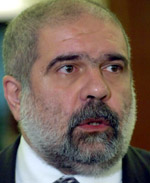The Armenian Apostolic Church reacted rather operatively to the “Da Vinci Code” film and the performance of the Finnish “Lordi” rock group, which placed first at “EuroVision”. The church considered similar portrayals of art as anti-Christian. While watching the film commercials and hearing about the victory of the Finnish rock group, some non-divine events were taking place in Armenia, particularly at the parliament. As we all saw, there were many anti-Christian things going on, such as swearing, betrayal, etc., however, the church didn’t react to that. It would be naïve to think that the clergy has to speak out on similar events every time (although we Armenian Apostolic Church believers would prefer that). However, it’s rather easy to react operatively to the danger of a film directed by a foreigner or the performance of a rock group from a distant country. The danger is far and is not aimed towards anyone in particular. It’s also easy to not say a word about Armenia’s inter-political chaos. So, why aren’t our clergymen reacting to the illegal acts committed by Armenian authorities, the disappointment and desperateness of people as a result of all that, which serves a firm basis for the flourishing of sects, suicides and other acts going against what’s written in the Bible? With the purpose of finding the answer to this and other questions, I asked head of the press divan of the Mother See of Holy Etchmiadzin Friar Ktrich, who listened to my questions and promised to direct me to the priest who would give me the answers. I was very disappointed because I didn’t get an answer from him the next day. He also didn’t respond to my calls. However, this isn’t the only thing that’s disappointing in Armenia.
“First it was Sahakashvili, then Soros”
While the church remains silent, politicians talk. Based on their not too positive predictions, there will not be a change in political figures or the political course in Armenia. According to director of the Caucasian mass media office, Alexander Iskandaryan, all that happened in the past month and what’s currently going on in the Armenian parliament was very predictable. There were disagreements between coalition members a long time ago. The basis for that was to see who would influence who.
“Theoretically, the split could have been postponed until 2007; however, it was very logical for it to happen. You are always in a search at the parliament-you get this much opportunity to export your product, I get this much, you get this many restaurants and saunas, I get this many railway routes, etc. This all leads to a crisis within the parliament. It’s like that in all countries. I’m just talking about the events and not the motives. The motive was the famous interview with Arthur Baghdasaryan where he said what he could have said, but only at a better time. He said that and left.”
According to Iskandaryan, Baghdasaryan doesn’t really have many chances to become a successful oppositionist for the time being. The Rule of Law lost its financial resources (the classic oppositional party not only needs an ideology, but also the elite, including the presence of businessmen). He says that all doesn’t end well when there is a lack of financial resources.
“The Rule of Law no longer has a media resource. It also doesn’t have the group of people ready to work in the oppositional field. The opposition has a specific way of working and it’s nothing like the parliament. Arthur Baghdasaryan is not like Vazgen Manukyan or Ashot Manucharyan. He’s not even like Stepan Demirchyan.”
It’s clear that it’s possible to work even without the media in Armenia. The city of Yerevan is one-third of the country and you can work from here to there, however you need people who are capable of doing the job. In order to reach success, it is necessary to coordinate, in other words, coordinate people who can’t be coordinated. However, Arthur Baghdasaryan still hasn’t shown any capabilities of doing that yet. According to Mr. Iskandaryan, this doesn’t mean the end.
“It is possible that Baghdasaryan or a group of people are theoretically ready to change the authorities. The only thing to do is gather 500,000 people at a square and keep them there for a month, make literate speeches, provide food, come up with mechanisms of resisting the police and get journalists. The skill to conduct parliamentary hearings on the control on railway routes is not the kind of skill needed to gather the people in a square and keep them there for a month.”
Theoretically, any political party that does a huge amount of work during this year, forms a 30-40 member faction in the parliament and a working group through the means of that faction, will have many chances during the 2008 presidential elections. Alexander Iskandaryan doesn’t believe that the West will help Armenia start a revolution.
“It is wrong to think that Soros started the revolution in Georgia. First it was Sahakashvili, then Soros. If there is someone in Armenia who can do the same thing as in Georgia, then everything will happen: CNN will provide coverage and Soros (let’s just use this name for the time being) will provide funding. But the funds are given to people who come out to the playing field. There is no other way. When Armenia has a real opposition and serious political figures, that’s when my opinion, as a political figure, will not matter to people. Each person on the street will know and understand that HE is the one and will go to the square. Soros will understand that too. But that will never happen in Armenia…”

